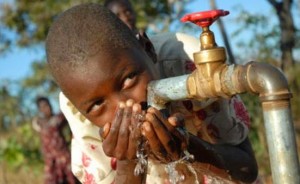CWSA strategizes to transform into utility service provider
 The Community Water and Sanitation Agency (CWSA) has initiated strategic reform processes that would eventually transform the Agency into a utility service provider.
The Community Water and Sanitation Agency (CWSA) has initiated strategic reform processes that would eventually transform the Agency into a utility service provider.
Mr Worlanyo Kwadwo Siabi, the Chief Executive Officer (CEO) who announced this, said the move was to empower, re-position and transform the CWSA to efficiently deliver its core mandate of providing and improving access to safe, reliable and affordable potable water, as well as water-related sanitation and hygiene services, to rural communities and small towns in Ghana.
Speaking at the opening of the 2019 review conference of the agency at Fumesua in the Ejisu Municipality in Ashanti, he said the reforms which was initiated in March 2017 sought to transform the entire Water, Sanitation and Hygiene (WASH) sub-sector into a utility services hub towards the achievement of Sustainable Development Goals (SDG) 6.
“We are 11 years away from 2030, the year for the Sustainable Development Goals (SDGs) and to achieve SDG 6 which seeks to ensure availability of water and sanitation for all, there is the need for new strategies and investments in the sector, so that we can achieve the targets set for ourselves in Ghana,” he stated.
The four-day conference among other things would brainstorm to formulate modalities to consolidate the gains whiles scaling-up efforts towards the completion of the reforms process.
The event was held under the theme, “Steps towards a Utility Organization, the Success Story, Challenges and Way Forward” and is being participated by delegates from all the 16 Regions across the Country.
Mr Siabi said even though access to potable water in the rural WASH sub-sector had seen some improvement since 2016, new investments and the policy reforms initiated by the Agency to transform the sector would see a remarkable increase in the 2019 water coverage figures.
The CEO said the Agency as part of the reforms had deployed new staff to manage 125 small towns pipe water systems, adding that, GH¢13,092,543.00 revenue had been generated from the sale of water since 2017.
He mentioned agitations by chiefs and other stakeholders in some communities over the management of water systems by CWSA, as one of the major challenges confronting the Agency.
Mr Siabi enumerated instances where the Agency had to relocate its staff from certain communities a few months after their deployment to certain communities and called for cooperation for efficient delivery of quality and affordable water to such communities in need.
Madam Cecilia Abena Dapaah, Minister for Sanitation and Water Resources, in a speech read on her behalf, said the idea to transform the rural water sub-sector and make it key in the sustainable management of WASH services was laudable.
The transformation, she said, became necessary in view of the fact that the community management model was plagued with a number of challenges that threatened the sustainability of the water supply assets provided by government.
“It is also obvious that the skills and competencies at the community level cannot cope with the increasing technological complexities of rural water supplies, resulting in the continuous cycle of breakdown and rehabilitation of existing water supply infrastructure with resources that should have been used to provide water systems to unserved communities,” she lamented.
She said while the agency devised various strategies for managing the existing stock of water supply infrastructure, they must not lose sight of the fact that there were still about 37.92 per cent of rural dwellers who did not have access to safe water at all.
It is for this reason, she noted, that government had secured $45.7million from the World Bank as additional financing to complete outstanding works under the Sustainable Rural Water and Sanitation Project which ended in 2016.
Source: GNA
